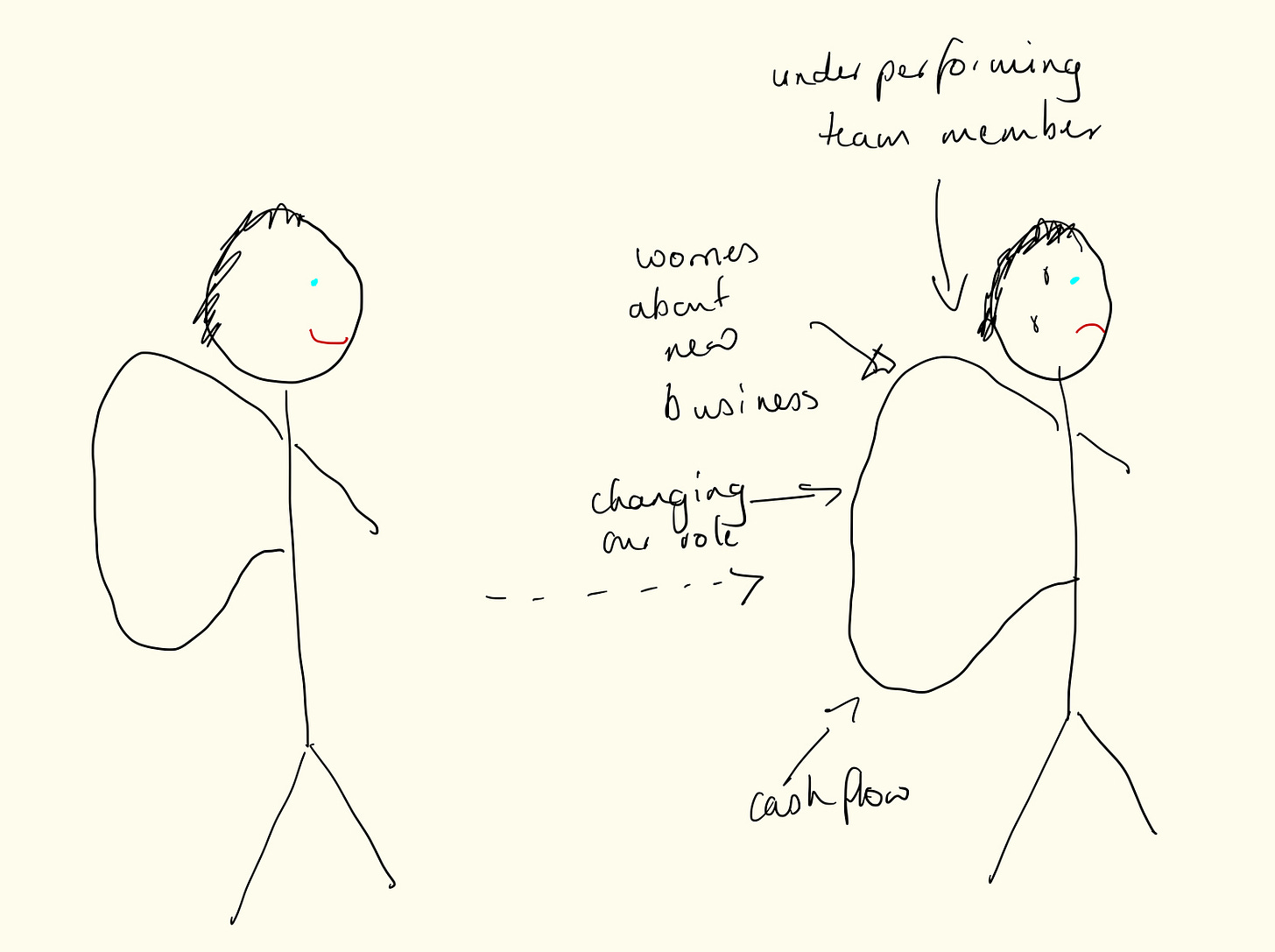Welcome to a free edition of Start Up To Grown Up: Your source for ideas, insights and tactics to take back control of your business and scale it sustainably and profitably by Heather Townsend, award-winning author of The Accountants’ Millionaires’ Club and Founder of The Accountants’ Growth Club.
The closer you get to clients, the more value you can bring.
But the heavier the burden you carry.
Getting closer to clients is often touted as the special sauce or the high-ticket price programme that will help our business take a huge step forward.
But are you in a place where you can take that burden?
Let's be honest: dealing with one struggling or troubled business can be stressful. But when that business becomes ten businesses, you will be taking on all their burdens.
That's pretty stressful.
If you take on this type of role or offer this type of service, you need to ensure you have a way of leaving your clients' woes when you leave your office.
Being a deeper, more immersed, and more valuable partner to your clients can potentially bring more rewards. But it does have a dark side.
Are you strong enough to cope?
The pressure increases
As business owners, we are used to being resilient. After all, it’s our superpower. It’s why we are still doing what we are doing and haven’t gone back to a “proper” job.
The best analogy I can give is that, as a business owner, we carry a rucksack. And in that rucksack, we keep on putting more and more bricks. This could be the pressure of an underperforming team member, a fragile pipeline of new business, the fear of not making the wages, needing to be more chargeable in the business to turn a profit, or working long hours. Or just getting used to the different responsibilities that our business now demands of us.
This heavy rucksack is fine until you start to walk uphill. At this point, the sheer weight that you are carrying could cause you to sink to your knees.
The hill? It is very often something that hits you for six from your personal or professional life. In my case, it was a hormonal imbalance during perimenopause coupled with my eldest leaving home to go to university.
These hills are always going to be there.
You can’t dodge them.
You just have to be resilient enough to scale them.
That means taking some of those bricks out of your rucksack. I.e. reduce your load.
How to reduce your load
Take a break
I am very much the pot talking to the kettle here, but it is essential to take regular breaks. This was a LinkedIn post I put up a fortnight before leaving for a week’s holiday. I was shattered at this point. With the benefit of hindsight, I was probably on the verge of burnout.
It shouldn’t get to this point before you take a break. (Reminder to self)
Taking a break is about:
Keeping a day or 2 during the week just for you and not the business. This may or may not be at the weekend.
Booking in 4-8 weeks of holiday a year. Block these dates out a year in advance. That way you are more likely to keep them.
Setting your boundaries hard and tall to preserve some time for you to think and recharge
Remember you are in control
A wise friend told me at the beginning of my time as a business owner.
You are in control of the accelerator pedal. Only you can push it down harder or ease off.
I often reflect on this wisdom: What am I doing to push on the accelerator, and is this helping me grow and scale my firm?
Here are some areas to explore to help you understand where you may be pushing too hard:
Which side projects, passion projects, or hobbies are no longer adding value? For example, do you need to be a trustee of a local charity or a school governor?
What on your to-do list can wait? For example, I have been torturing myself to finish a leadership programme design before launch when most elements have not been needed for months.
How much business do you need to win? How many of your targets are ego-driven rather than grounded in pragmatism? After all, could you really handle 50-200% growth over the next 12-24 months?
Get your team to step up.
Last night, we dropped off my son at university. It was a wrench, and I’m still fragile. At times, it has felt like my right arm is being chopped off without anaesthetic. However, as of last night, he has ‘left home’. I decided to leave him to sort his packing out. After all, he’s an adult now.
In the last 12 hours, it has become apparent that he forgot to pack:
Towels
His karate kit
His climbing kit
His warm winter coat, hat, gloves and scarf
The new trousers and teeshirts I got for him
That’s just the stuff we know about!
With the benefit of hindsight, I should have been much closer to him with his packing. He needed much more supervision as he wasn’t competent enough to do it alone.
There are many parallels here with your team members. If you are not hitting the sweet spot of enough supervision and support, then you will find yourself putting out fires. Or, as I found, driving to a friend’s house at 08:30 this morning to drop some towels off as they were dropping their son off at the same university this morning!
Ask yourself: which of your team members needs help to step up? Either to stop the crises falling on your shoulders or to help you lighten the load.
Learn to say ‘no’
Most of us are rarely in a life-or-death situation. We are not paramedics or clinicians. This means you can say ‘no’. This means to good clients, team members, family members or friends.
I turned down the opportunity to go to the theatre with really good friends this week. Did I cry when I took the decision? Yes. Was my body telling me I needed to rest and recharge? Yes. Did I ultimately take the right decision, yes.
Want to explore more on becoming more resilient? Then scroll down 👇🏼 for my substack and book recommendations on these topics.
Book recommendations
Mike Michalowicz Clockwork: design your business to run itself
Clockwork explains how business owners can grow their business without sacrificing their sanity. The trick is implementing smart systems and standard operating procedures that allow your business to run like clockwork without your constant input, freeing you up to tackle the challenges or embrace the opportunities that come your way. This book (which we recommend frequently) helps you from being bogged down in the daily grind, constantly putting out fires, answering an endless stream of questions, and continually hunting for cash.
Kevin N. Lawrence Your oxygen mask first
Here’s the hard truth about leadership: it either forces you to get stronger or it slowly destroys your life. There is no in-between. Kevin Lawrence has discovered seventeen habits that allow any leader to transcend the perils of success and keep achieving—habits that have already helped hundreds of CEOs and executives become stronger and more resilient.
Obsessed with understanding why successful people crash and burn, Lawrence has studied and tested virtually every leadership theory known to humankind in his two decades as a business advisor. His straight-talk advice in Your Oxygen Mask First will surprise and propel even the most seasoned leaders as he cuts through the platitudes and jargon to share the best tools he has found to ensure your survival, no matter how high you fly.
Substack recommendations
While
substack is written for software developers, this is an excellent article on the causes of burnout and stress. It offers some great tips for ensuring the right communication happens between key people and teams.I love this article by
on how to reframe stress. After all, as Kristine says, stress is painted as something that is ‘bad’. I know that we need a level of stress to perform at our best. However, if you see stress as enhancing and something to learn from you will perform better and be able to cope with higher levels of pressure.





